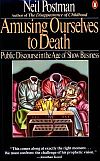 (Original): The Gospel and the Gosselins
(Original): The Gospel and the Gosselins
(Archived): The Gospel and the Gosselins
Reality shows honestly make me ill, kind of like Jerry Springer shows in the middle of the day when you are sick and nothing else is on so you just wind up turning the thing off. The concept is worn out, over-used, uncreative, trivial, trite, shallow, and mind-numbingly boring. I can’t think of anything else I’d rather not watch on television than reality shows, because they are anything but what they claim to be and cheapen the very concept of … well, reality. TV becoming “reality”? I don’t get it and fail to understand how an entire culture is okay with this stuff.
Huxley’s vision of the future, portrayed in Brave New World, is coming to pass and we’re okay with the mundane, the brainless, coming to love our servitude to nonsense and emotionalism. Instead of having an outside oppressor like a totalitarian regime control us by brute force, as portrayed by George Orwell in 1984, instead what we love is killing us and holding us captive (Amusing Ourselves to Death … read it, everyone). Coincidentally, that is exactly what sin does. I honestly believe these shows are all loosely scripted to give the portrayal of “reality” and lack any level of depth that would give them some form of lasting cultural value (you know, like a Shakespeare work or Homer’s Iliad). They are trivial and a giant waste of time to be involved in.
But that’s all just an opinion. On the basis of someone else’s taste preferences, the same could probably also be said of shows that I like such as 24, The Office and FoxNews. My taste preferences are not the same as others. TV in itself is a waste of time (in general) … and I honestly like some of it. Guilty as charged.
Regardless of what I think concerning reality shows, many people like them, and can’t wait for the next episode to come around. Okay, fine and good, I don’t take issue with that. However, the “reality” show Jon and Kate Plus 8 on TLC has brought to light something evangelicals really don’t want to talk about (which the fact we don’t want to talk about it is a whole other issue in itself): our acceptance and absorption of the cultures’ worldly, materialistic, narcissistic, self-absorbed values; the slow (or fast, depending on the timeline we’re talking about) slide toward the secularization of the evangelical church in America.

 It is one thing to loudly proclaim the utter grotesqueness and obvious immorality of a practice that has been accepted by law in this country and then call for its reversal; it is quite another to murder those supporters or doctors of such practices and defies the very nature of the life movement at its foundation. We should never execute judgment or vengeance on those with whom we are in disagreement, even in the face of gross, rampant immorality.
It is one thing to loudly proclaim the utter grotesqueness and obvious immorality of a practice that has been accepted by law in this country and then call for its reversal; it is quite another to murder those supporters or doctors of such practices and defies the very nature of the life movement at its foundation. We should never execute judgment or vengeance on those with whom we are in disagreement, even in the face of gross, rampant immorality. “Indeed, all who desire to live a godly life in Christ Jesus will be persecuted.” – 2 Timothy 3:12
“Indeed, all who desire to live a godly life in Christ Jesus will be persecuted.” – 2 Timothy 3:12 “What Orwell feared were those who would ban books. What Huxley feared was that there would be no reason to ban a book, for there would be no one who wanted to read one. Orwell feared those who would deprive us of information. Huxley feared those who would give us so much that we would be reduced to passivity and egoism. Orwell feared that the truth would be concealed from us. Huxley feared the truth would be drowned in a sea of irrelevance. Orwell feared we would become a captive culture. Huxley feared we would become a trivial culture, preoccupied with some equivalent of the feelies, the orgy porgy, and the centrifugal bumblepuppy. As Huxley remarked in Brave New World Revisited, the civil libertarians and rationalists who are ever on the alert to oppose tyranny ‘failed to take into account man’s almost infinite appetite for distractions.’ In 1984, Orwell added, people are controlled by inflicting pain. In Brave New World, they are controlled by inflicting pleasure. In short, Orwell feared that what we hate will ruin us. Huxley feared that what we love will ruin us.”
“What Orwell feared were those who would ban books. What Huxley feared was that there would be no reason to ban a book, for there would be no one who wanted to read one. Orwell feared those who would deprive us of information. Huxley feared those who would give us so much that we would be reduced to passivity and egoism. Orwell feared that the truth would be concealed from us. Huxley feared the truth would be drowned in a sea of irrelevance. Orwell feared we would become a captive culture. Huxley feared we would become a trivial culture, preoccupied with some equivalent of the feelies, the orgy porgy, and the centrifugal bumblepuppy. As Huxley remarked in Brave New World Revisited, the civil libertarians and rationalists who are ever on the alert to oppose tyranny ‘failed to take into account man’s almost infinite appetite for distractions.’ In 1984, Orwell added, people are controlled by inflicting pain. In Brave New World, they are controlled by inflicting pleasure. In short, Orwell feared that what we hate will ruin us. Huxley feared that what we love will ruin us.” This is a “prophetic” word from Calvin out of the Institutes related to the postmodern sensibilities of Western Christianity. I’m not implying Calvin was speaking directly against postmodernism itself as a formal philosophy, as it had not yet been articulated, but this certainly does speak against its core tenets asserted today, to be sure. And I would say that ultimately, postmodernism, within the setting of Christianity, leaves a person without certainty that they will be accepted before God, which is exactly what Calvin explains in this section. The reason for this is because if you have no certainty and a house built on solid rock, ultimately, you will try and pick up the slack of uncertainty through your own deeds, works and effort in order to please God, which oddly enough, is what we see happening with many (though not all) postmoderns in the focus of various ministry focal points (i.e. deeds versus creeds).
This is a “prophetic” word from Calvin out of the Institutes related to the postmodern sensibilities of Western Christianity. I’m not implying Calvin was speaking directly against postmodernism itself as a formal philosophy, as it had not yet been articulated, but this certainly does speak against its core tenets asserted today, to be sure. And I would say that ultimately, postmodernism, within the setting of Christianity, leaves a person without certainty that they will be accepted before God, which is exactly what Calvin explains in this section. The reason for this is because if you have no certainty and a house built on solid rock, ultimately, you will try and pick up the slack of uncertainty through your own deeds, works and effort in order to please God, which oddly enough, is what we see happening with many (though not all) postmoderns in the focus of various ministry focal points (i.e. deeds versus creeds).